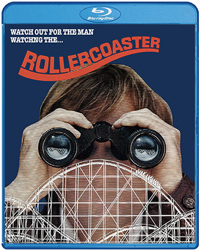 How curious it feels to watch the 1977 dramatic thriller Rollercoaster in today’s contemporary climate of terrorized public places, where mass gatherings have increasingly become the target of violent criminal attacks. Forgotten behind a string of mainstream disaster films and savage action films which proliferated US cinema during a similar period, this James Goldstone directed thriller (which inspired him to try volcanoes next with the laughable When Time Ran Out…, 1980) finds a man sabotaging rides at amusement parks in hopes to blackmail their owners, who would rather pay him to stop than deal with the economic fallout of a media frenzy suggesting their family friendly environments were lethal. The film’s implications seem eerily topical today, even if the film ultimately deals with such villainy in antiquated terms (and seems more of a prototype for something like Speed, 1994).
How curious it feels to watch the 1977 dramatic thriller Rollercoaster in today’s contemporary climate of terrorized public places, where mass gatherings have increasingly become the target of violent criminal attacks. Forgotten behind a string of mainstream disaster films and savage action films which proliferated US cinema during a similar period, this James Goldstone directed thriller (which inspired him to try volcanoes next with the laughable When Time Ran Out…, 1980) finds a man sabotaging rides at amusement parks in hopes to blackmail their owners, who would rather pay him to stop than deal with the economic fallout of a media frenzy suggesting their family friendly environments were lethal. The film’s implications seem eerily topical today, even if the film ultimately deals with such villainy in antiquated terms (and seems more of a prototype for something like Speed, 1994).
A cold blooded killer (Timothy Bottoms) has begun targeting amusement parks across the US, derailing rollercoasters, causing murder and mayhem in a series of seemingly unconnected incidents. When safety inspector Harry Calder (George Segal) begins to see a startling pattern, he finds the owners of the parks are being blackmailed by the killer, who threatens to continue his rampage unless they pay him. Calder involves the FBI, and they are assisted by Agent Hoyt (Richard Widmark), which angers the killer and sets off a battle of wits between himself and the dogged Calder.
At a running time of nearly two hours, Rollercoaster butchers whatever momentum is established following its opening explosive sequence, where cars filled with obvious dummies careen in delayed fashion off the rails and onto clueless bystanders. The rest of the film becomes a methodical cat-and-mouse exercise where the overly dependable George Segal hunts down Timothy Bottom’s appallingly transparent terrorist (a man whose motivations, beyond extorting the park owners, is never explained). Hampered by a bureaucratic process, Segal’s investigator spends most of the time battling the wills of those interested in keeping the parks running despite the danger to human lives (a la, keeping the beaches open in Jaws), and those who seem to have better but ultimately less efficient ways of nabbing the killer (Henry Fonda is wasted here, but Richard Widmark makes sure to get in a bit of scene chewing). Other supporting players, such as Susan Strasberg and Helen Hunt as the wife and daughter of Segal, are mere props. Craig Wasson (Body Double, 1984) stands out in a brief sequence as a gum-chewing hippie who boards the final rollercoaster moments before it’s been marked for destruction.
Despite the film’s patience testing pacing problems, much of this feels like a padded television feature. Written by Richard Levinson and William Link (who would eventually be known for items such as “Murder, She Wrote,” and “Columbo”), the film was directed by Goldstone, who spent most of his career in television and after Rollercoaster would embark on a string of made-for-TV movies concerning hot topic subjects (like Rita Hayworth, Kent State, and the enduring romance of Charles and Diana). The grand finale is notable, however, for featuring Magic Mountain and a musical performance from the band Sparks.
Disc Review:
Shout Factory presents Rollercoaster in 2.35:1 and includes the original SENSURROUND (a process developed to enhance the audio experience) soundtrack, which also gives a sense of the film’s gimmickries. DP David M. Walsh, who lensed The Goodbye Girl the same year, doesn’t get much of a chance to show off, as way too many sequences feature Segal grimacing in response to a group of skeptical, wizened white men. An interview with writer Tommy Cook, who has story credit, is also included.
Tommy Cook Interview:
In this twelve minute segment, writer Tommy Cook is interviewed on the process of writing Rollercoaster.
Final Thoughts:
Fans of vintage disaster flicks will most likely find Rollercoaster a trudge to get through, but George Segal is a likeable lead in a film which could have been a lot more distinguished.
Film Review: ★★½/☆☆☆☆☆
Disc Review: ★★★/☆☆☆☆☆


